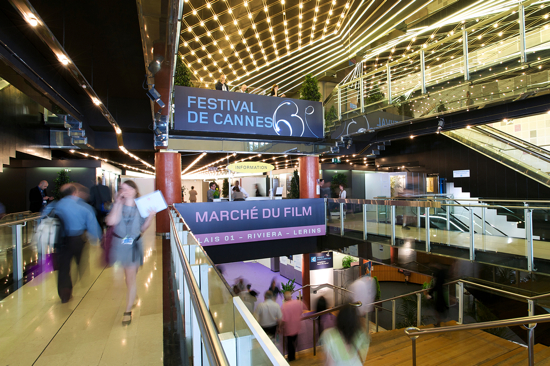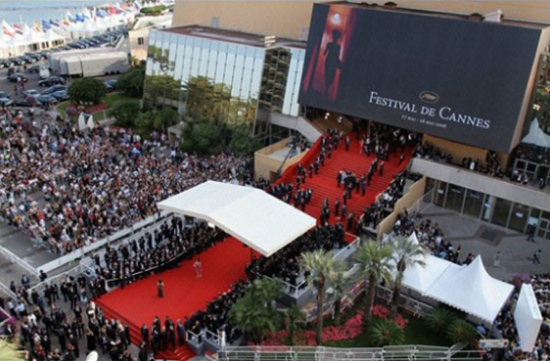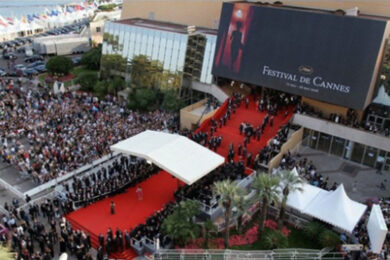Given that The Angels’ Share screened in competition at this year’s Cannes (eventually winning the festival’s Jury Prize), it’s no stretch to say that Ken Loach was the event’s headline attendee from the UK. However, there were hundreds of others of his compatriots there from all levels and in varying capacities. They ranged from nervous, aspirant first timers to vibrant production companies doing good business as usual, via battle-weary regulars hustling to secure financing and/or commitments that will see them through the next 12 months, all the way to the dizzy formal heights of Ed Vaizey, Minister for Culture, Communications and Creative Industries.
The first thing that everyone will tell you about the 2012 Festival de Cannes is how much it rained. Funnily enough the other designer jamboree in this neck of the woods, the Monaco Grand Prix, also got soaked. Meanwhile, the UK basked in sunshine. As you can imagine, for all the excited British filmmakers arriving at the Côte d’Azur between May 16 and 27, the weather was the perfect icebreaker as you tried to move beyond small talk to: Here’s my project pitch, is it something you would be interested in? Here’s my card – can I get your card too?
The second thing everyone will tell you is how hard it is to make the trip worthwhile. You may think that it is the International Festival of Red Carpets, Big Yachts and Parties. However, from a business point of view this is the one small window of time when Hollywood is in a square mile of Europe. It’s an opportunity to get meetings, get contacts and move that bit closer to seeing your ideas reach a cinema complex near you and the rest of the world.
This is only my second time at the festival; the first was last year. This makes me still very much a Cannes virgin. I’m a journalist and band manager (Tokyo Dragons) turned screenwriter. Therefore, in the film world I barely exist. This isn’t some cruel twist of fate, nor a woe-is-me statement, just a simple reality. However, Cannes is one of the few environments where you can actively start to do something about it.
Picking up my festival pass I am struck by an overwhelming feeling that I could have done so much more beforehand to help me get meetings and identify who to seek out. My focus is on two feature film projects. The Extremist is an action thriller I have co-written with Clive Ashenden. It’s about an elite anti-terror cop who wakes from a six-year coma to discover that his act of vengeance has spawned a nightmare world where a new Hitler has risen to power. Now he must become the ultimate terrorist to prevent global genocide. Longest Night is a horror thriller I have written for director Simon Aitken. It’s about a conservative farmer who is forced to work with male escorts, pimps and paedophiles to save his runaway son from being ritually sacrificed by a maniacal priest.
I spend the best part of the first day meeting up with friends who have also made the trip. A nice coincidence was bumping into former Pale Saints/Edsel Auctioneer guitarist Ashley Horner – someone I’d been introduced to in 2011. When Ashley finally hung up his guitar he ran away to film school in Toronto, returned to England a director and producer and set up Pinball Films. He’s been coming to Cannes for more than a decade and advised me last year that it took him four trips to really get his head around the event. Now sporting a moustache, he jokes that he wants to look as sleazy a producer as he can for the festival.
On the second day the rain falls and seemingly doesn’t stop for five days straight. Like most attendees my suitcase erred on the need for sunscreen, not Gore-Tex apparel and Hunter wellies. The festival activities are focused on a single location, the Palais des Festivals, which is where you see the red carpet premieres lead into. The building also houses the Marché du Film – read huge conference centre – an obvious dry haven between meetings. It is a hard and fast world of movie dreams and nightmares. Film distributors and agents looking to buy and sell compete in this hive of activity. Everyone who aspires to make a movie must visit this place at least once to even begin to understand how the industry commodifies creativity for the mass market. In the Marché du Film, genre is king by a country mile: horror, sci-fi and action thrillers dominate the space. This is what you need to see and understand if you’re going to write a movie speculatively. Namely, which production company will buy it from you plus, more importantly, who will sell it (and how). It’s a tough arena to pitch yet to be produced films, arguably the wrong place altogether, and had the weather let up I would have run for the sunshine and sea air in a flash.
In a bright spell I meet up with London-based actor and producer Maria Thomas. It is her first Cannes, but boundless energy and a fast understanding of what’s needed here is apparent. As she says: "It’s important to meet the right people and set up the right meetings, but they could happen at parties too." Maria plays the lead in my latest co-written/co-produced (with Clive Ashenden) short film, Out Of Hours. It was available to watch in one of the many booths at the Short Film Corner. Selection for this part of the festival qualified us for passes – a fact that wasn’t confirmed until the end of a very nerve-wracking April. Given the section’s entry-level status Clive observes, "The SFC is like a microcosm of the Marché, only with added fresh-faced hope." Although the daily 5pm happy hour reduces it to a sixth form scrum for scant free booze stocks that barely survive to 5.30pm.
Each time I meet Maria she is quick to introduce me to new people. One such acquaintance is writer and comedian Adam Ethan Crow. Better known in the UK as a stand-up, he’s expanded into screenwriting with some success and is here with a script that’s been optioned through InkTip: a website that helps get your work into producers’ hands without you having to move out to Los Angeles. Proof, if writers needed it, that your speculative script is an afterthought of a film financing deal, not the reason to set one up. A review of Adam’s comedy in The List enthuses, "His snappy one-liners place him in good company with the likes of Diablo Cody and Quentin Tarantino." So maybe this was a natural transition waiting to happen.
A rest stop at the market’s UK Pavillion during a particularly heavy shower finds me sat opposite Adrian Bracken, an executive at Marbella Productions. A retired engineer who now lives out in Spain and makes movies, he proudly shows off a thrilling trailer via his iPhone. Shot on an old spaghetti western set in Almería, down in Andalusia, his "The Matrix meets Sergio Leone" film is called Bulletfist – The Legend Of King Boot.

Night time is when would-be hustlers can do their best and/or worst work. A time-served player at Cannes can wangle a spot at most parties. A novice with some front and the right attitude can talk their way into a few. One, maybe two drinks on the terrace at Le Grand Hotel should in theory feel like you’re mixing it with the great and the good. Although all I hear – indeed catch myself exclaiming – is: "Eight euros for a half!" It’s here that I spot actor and writer Chris Coghill. Chris is someone I know from my Manchester days, drinking in the Ostrich, Heaton Park. It’s ironic that he’s in Cannes promoting the feature he penned, Spike Island, just a few weeks away from The Stone Roses reunion that will take place across the road from the Joseph Holts pub we used to frequent. A happy accident that all the marketing minds in the world couldn’t have planned.
When the Abu Dhabi party is done, or ARTE want you off their boat, the place where all Cannes devotees eventually descend is Le Petit Majestic. Few can resist this bar when they’re not done with having a good time. One veteran describes it as, "The primeval swamp – from where all great filmmakers crawl and all eventually will return." Positively, he believes the Petit Majestic "is the real centre of the festival". Sure enough, I have my best times and make my best contacts here.
Three days after bumping into each other, I phone Ashley Horner to get his advice on funding options for a new project. He points me to the Irish Pavillion for 4pm. I duly turn up. He texts he will be late by 45 minutes. I go get something to eat. At 4.45pm he texts me new instructions: go to the lobby of the Gray d’Albion Hotel and call again. In ten minutes I’m there. Ashley enters through the front door and leads me out muttering he’s been up two days straight. He looks serious. I follow about three steps behind. We are buzzed into a building just around the corner and then greeted by more security. There’s a column of numbered buzzers with one covered by a scrap of paper that has ‘ACE’ written in biro on it. We are buzzed in and Ashley simply says, Thanks ladies. I follow him like a browbeaten PA would the boss, until we exit a lift and walk into a secret little bolt-hole where smiling faces offer me wine or beer and welcome Ashley in like a long lost relative.
We don’t get to finish our first drink when his phone rings and we’re off again, to the Grand and then a Screen International party at Chivas House. By this stage the relentless rain is dragging me down. On the walk over, under my umbrella, he throws me a surprise bone: "I want you to write a contemporary western with me." We talk about it briefly before we find who he’s come to meet at the Grand. After swapping cards with a few more new people we leave for Chivas House. Ashley leads the way and helps the whole mini-entourage gain entry. I bump into my co-writer, Clive, as Ashley heads for the bar and Ed Vaizey finishes his speech. Finally, some free booze.
When the party is over we hook up with whisky-damaged Ashley for a few more at the Petit Majestic. In between brutally attacking Out Of Hours he tells us how the VP of a large 35mm film company wants to transfer a Super 8 feature he has produced so it can be shown on big screens. Directed by Rona Mark, it’s a "lo-fi, sci-fi, blaxploitation beat movie" titled Objects Attack!
Everyone in the UK that has an ambition to make films needs to go to Cannes at least once. And then you’ll go back again if you still really want to make them.



